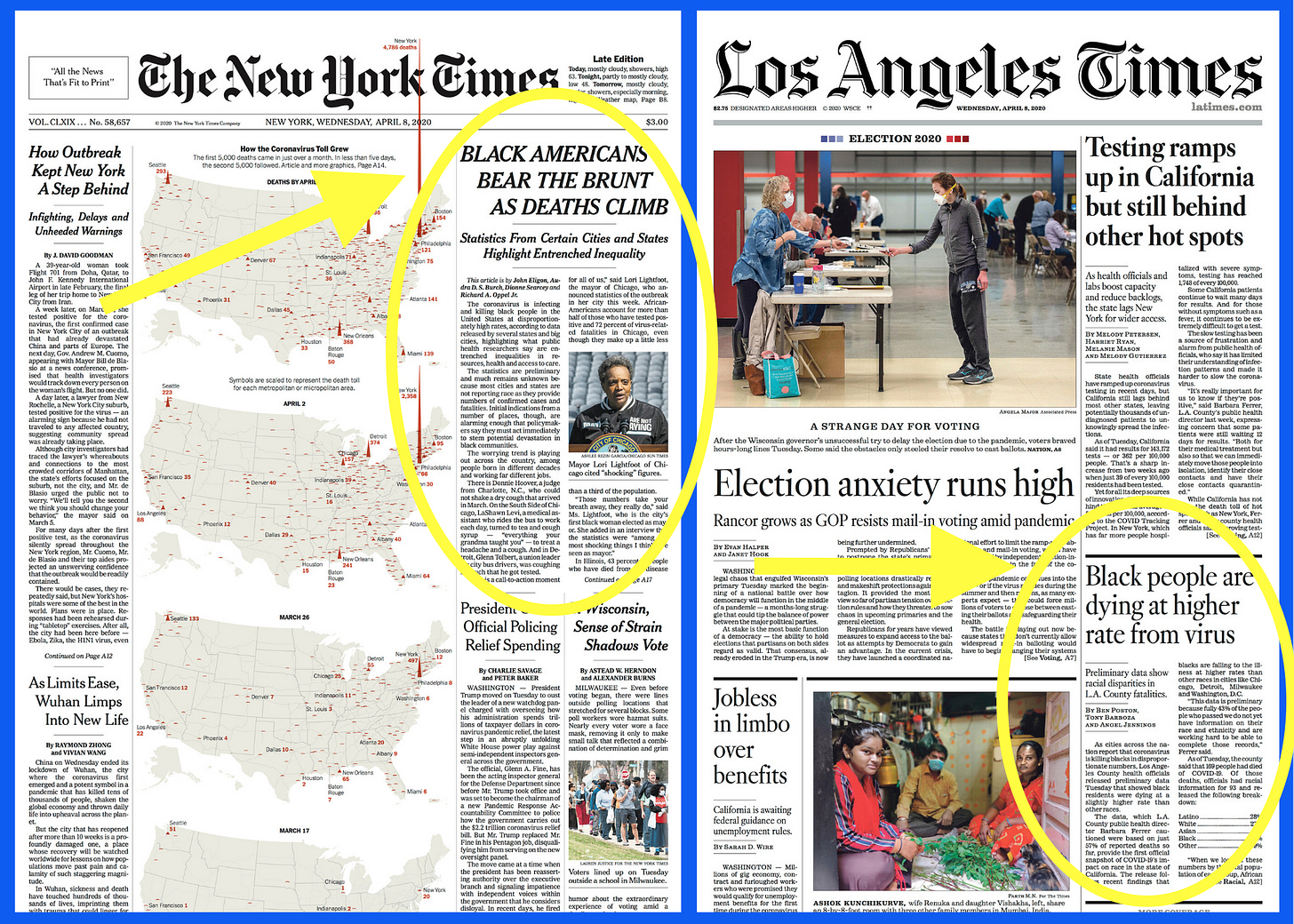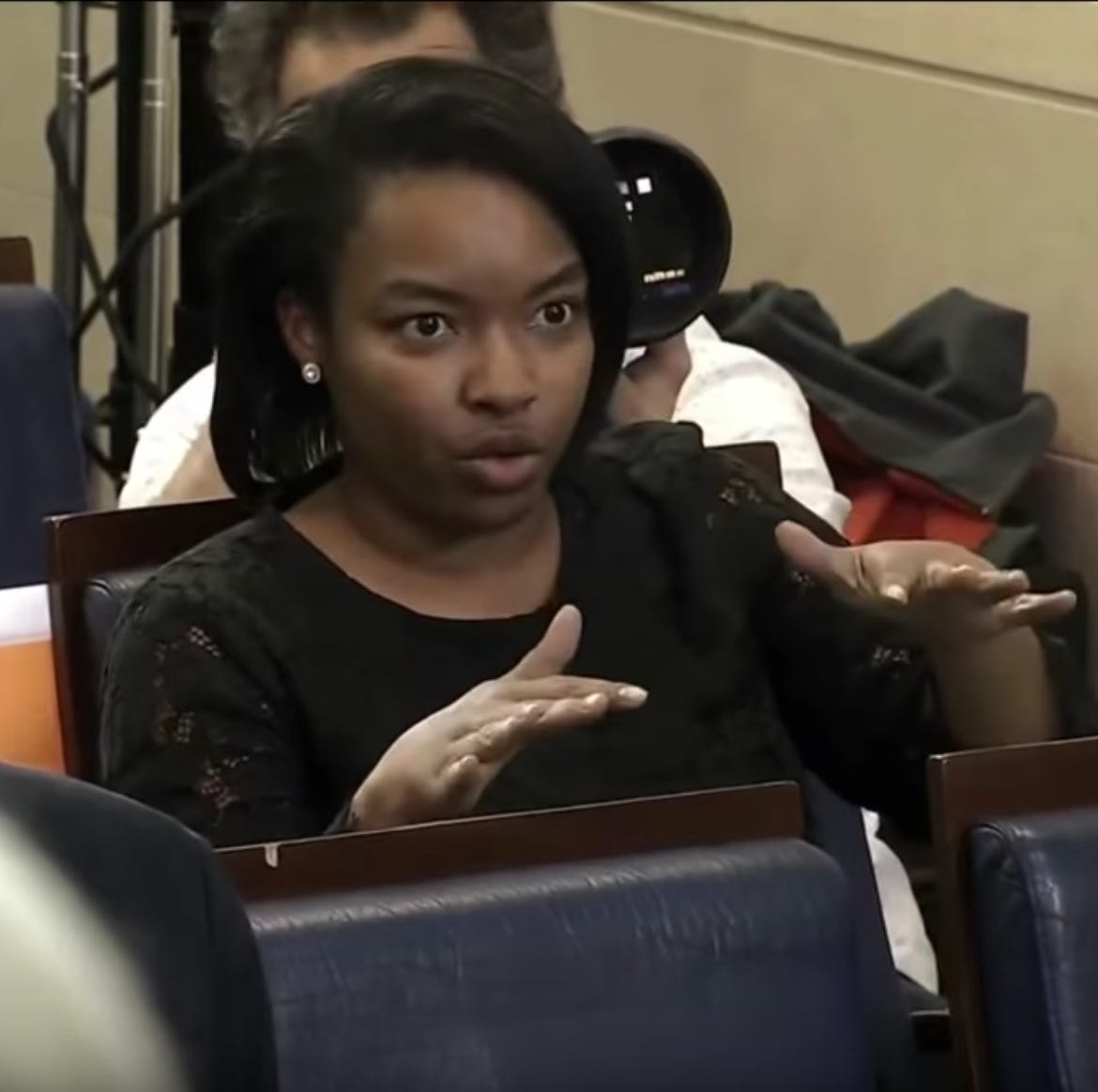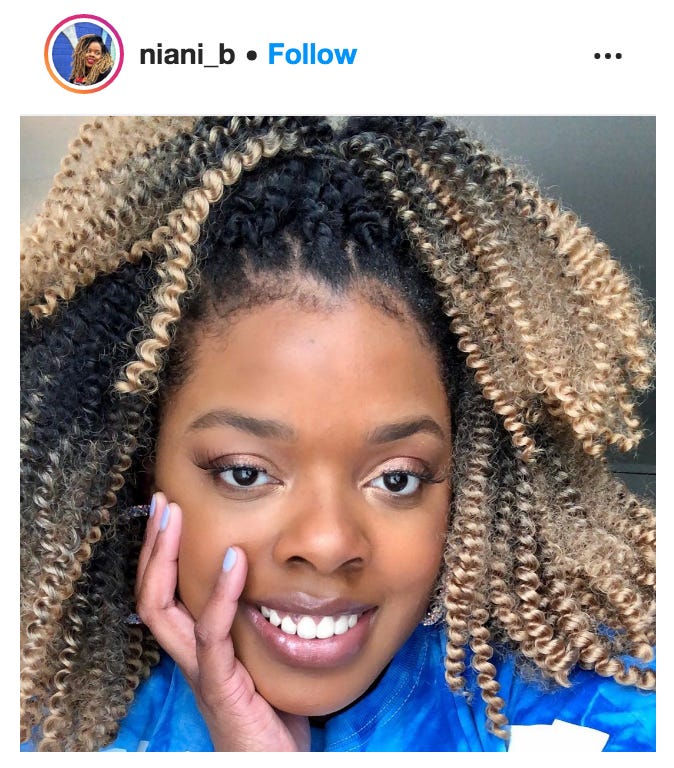Front Page News and Black Men in Masks
Black men in masks worry about racial profiling, Detroit hairstylist helps women learn how to braid, Black death rates make the front page, President addresses racial disparities and more...
Speak Patrice Presents: Coronavirus News for Black Folks is an independent, ad-free newsletter that aims to empower our community by sharing existing coronavirus (COVID-19) news and stories as they relate to the Black Diaspora.
Please consider (1) clicking that itty bitty ❤️at the top of this email next to my name to “like” us, (2) supporting this newsletter by sharing it with friends and family, and (3) subscribing for free below:
A quick reader survey…
Patrice, here! I created an *anonymous* survey to get a better sense of:
Who’s reading the CNFBF newsletter
Where/when/why/how they’re reading it
What you’d like the newsletter to cover
IN TODAY’S NEWSLETTER:
1. 📰 COVID-19 racial disparity is highlighted on front pages and at Tuesday’s White House press briefing
2. 😷 Black men speak out about fears of wearing masks and being racially profiled
3. 🔢 A sobering breakdown of the COVID-19 Black deaths in cities and states compared to the corresponding city or state’s Black population
4. 💆🏾This Detroit hairstylist created an online class specifically “for Black girls who never learned how to braid”
📰 COVID-19 racial disparity is highlighted on front pages and at Tuesday’s White House press briefing

As Belcalis Marlenis Almánzar famously said about COVID-19, “Sh*t is getting real.” You know that’s the case when news about the disproportionate rates of COVID-19 cases and deaths among the Black community makes the front page of several legacy U.S. news publications *on the same day* AND President Trump and his administration directly highlight this disparity at their daily press briefing.
A HANDFUL OF TODAY’S FRONT PAGE HEADLINES:
“Black Americans Bear the Brunt as Deaths Climb,” The New York Times
“Black People Are Dying At Higher Rate From Virus,” Los Angeles Times
“COVID-19 Killing Black Americans At Alarming Rate, Post Study Shows,” The Washington Post
“Blacks, Latinos Appear To Bear Virus’s Brunt,” Boston Globe
“Blacks Account For Huge Percentage Of Virus Deaths,” Detroit Free Press
“Hardest Hit on LI,” Newsday (This article spotlights disparity facing “Hispanic” communities, but I still wanted to include in solidarity.)
Fun fact: you can find 675 up-to-date newspaper front pages here at Newseum.com.
Here’s what President Trump & Dr. Anthony Fauci had to say about these disproportionate rates at yesterday’s White House press briefing:
President Donald Trump: “We’re actively engaging on the problem of increased impacts — this is a real problem, and it’s showing up very strongly in our data — on the African American community. And we’re doing everything in our power to address this challenge — it’s a tremendous challenge; it’s terrible — and provide support to African American citizens of this country who are going through a lot. But it’s been disproportional. They’re getting hit very, very hard.”
Dr. Anthony, director of the National Institute of Allergy and Infectious Diseases and leading member of the White House Coronavirus Task Force:
"Unfortunately, when you look at the predisposing conditions that lead to a bad outcome with coronavirus, the things that get people into ICUs that require intubation and often lead to death, they are just those very comorbidities that are unfortunately disproportionately prevalent in the African American population.
So we’re very concerned about that. It’s very sad. It’s nothing we can do about it right now except to try and give them the best possible care to avoid those complications.”

Also, despite the president and Dr. Fauci’s emphasizing the “tremendous” nature of this issue, NPR’s White House correspondent Ayesha Rascoe seems to have been the only journalist at the press briefing who posed a question about the disproportionate rates (although there are less journalists in attendance due to the social distancing efforts in the press room).
Rascoe (pictured below) asked President Trump (1) whether he planned on requiring the CDC to collect COVID-19 data by race (only select states are doing so, at the moment) and (2) what he planned to do about this disparity.

😷 Black men speak out about fears of wearing masks and being racially profiled
There’s been much talk about how this pandemic has forced our global society into a new normal. That it’s a “great equalizer” because the coronavirus disease does not discriminate against race, gender, sexuality, nationality, or socioeconomic status. And yet, we know those two claims aren’t exactly true. Otherwise, Black men wouldn’t be afraid to comply with the CDC’s most recent recommendation to WEAR. A. MASK. (also, this newsletter wouldn’t really be necessary…) This issue is a perfect example of how our new normal still contains our “old” history and culture of racism and discrimination.
Here are some reports and essays on the topic:
1. Wood River Officer Made Men Leave Walmart Because They Wore Masks
— by Jeanie Stephens, The Telegraph
“Being a young African-American male, it’s kind of hard when you interact with the police because you don’t know what state of mind they’re in,” said Jermon Best.
Diangelo Jackson said “just watching a lot of videos of police officers abusing their authority towards people was keeping me afraid, wondering why this cop was harassing us.
”I was just more worried about him doing something he’s not supposed to do,” Jackson said. [continue reading]
2. Why I Don’t Feel Safe Wearing A Face Mask
I’m a Black man living in this world. I want to stay alive, but I also want to stay alive.
— by Aaron Thomas (@Aaron_TheThomas), Boston Globe
“On Saturday I thought about the errands I need to make this week, including a trip to the grocery store. I thought I could use one of my old bandanas as a mask. But then my voice of self-protection reminded me that I, a Black man, cannot walk into a store with a bandana covering the greater part of my face if I also expect to walk out of that store.” [continue reading]
3. Why Some People of Color Say They Won't Wear Homemade Masks
— Fernando Alfonso III (@fernalfonso), CNN
"I will be wearing a mask because it can protect other people from what I may potentially have. But what I will also do while wearing a mask is all the things that I'm already doing as a black person in Atlanta. I will text people before I leave the house so that someone knows where I am. I'll make sure to travel with someone that I know or to let someone know when I get back home.
If I take walks, I'll make sure that I say hi to people so that they can recognize that I live in the neighborhood. I'll do all the things I would do if I was afraid of being stopped by the police anyways." [continue reading]
4. Mother Shares Her Face Mask Fears
— by Cheryl Hurd (@hurd_hurd), NBC Bay Area
“The mother of an 18-year-old African American man said some black men are refusing to wear masks because they fear for their lives.
Jenny Kipp from San Francisco expressed her thoughts in a social media post asking her neighbors not to be scared of African American people in masks.” [continue reading and watch video]
And here are some tweets on the topic:




🔢 A sobering breakdown of the COVID-19 Black deaths in cities and states compared to the corresponding city or state’s Black population
*Rough estimates as of publication. Data sources are hyperlinked.
70% | 26% - Milwaukee County, Wisconsin
70% | 29% - Chicago
“Patients dying of COVID-19 are disproportionately black. Chicago’s mayor isn’t surprised,” PBS News Hour
“In Chicago, 70% of COVID-19 Deaths Are Black,” WBEZ 91.5 Chicago
70% | 32% - Louisiana
“Louisiana Sen. Cassidy Addresses Racial Disparities In Coronavirus Deaths,” NPR
“Coronavirus disparity in Louisiana: About 70% of the victims are black, but why?,” nola.com
60% | 46% - Washington, D.C.
“The coronavirus is infecting and killing black Americans at an alarmingly high rate,” The Washington Post
40% | %14 - Michigan
“Black people make up 12% of Michigan's population — and at least 40% of its coronavirus deaths,” Detroit Metro Times
42% | 15% - Illinois
“42% of Illinois’ coronavirus deaths are black people — but only 15% of the state population is,” Chicago Sun-Times
31% | 22% - North Carolina
16% | 10% - Connecticut
No articles found on this data. The data set is here.
14% (critically ill, not deaths) | 3.3% - United Kingdom
💆🏾 This Detroit hairstylist created an online class specifically “for Black girls who never learned how to braid”

Meet Niani Barracks. The Detroit-based hairstylist found herself out of work when Michigan Gov. Gretchen Whitmer ordered a statewide shutdown of all salons. Determined to keep working without putting herself or potential clients at risk, Barracks, 31, launched “A Safe Space For Black Girls Who Never Learned How to Braid,” a live online course to help Black women develop their own hairstyling skills while sheltering at home. (Barracks created a separate course for people who are not Black women who would still like to learn or support.)
“A lot of women are just saying how they’ve always felt bad or felt ashamed that they didn’t understand their hair, or didn’t know how to do their hair,” she recently told ESSENCE.
“I had moms in the group who just wanted the opportunity to bond with their children, and do their hair. We have artwork with the different generations styling each other’s hair, and they just want to feel that bond, and feel that special moment. So that just made me feel so good that I could support them on that.”
The one-hour course costs $5 and is held twice a week, Thursday at 9PM and Saturday at 1PM, ESSENCE reported. Barrack has since added Zoom consultations and 1-on-1 virtual styling sessions to her service offerings.
Here’s the full ESSENCE write-up by Shalwah Evans…
“Niani B. Is Creating A Safe Space For Black Women That Never Learned To Braid”
A related New York Times article by Sandra E. Garcia that also featured Barracks…
“Black Women Learn to Braid While Social Distancing”
And a Refinery29 Unbothered article by Darian Symoné Harvin about how Black hairstylists and their clients are navigating new forms of employment and personal at-home hair care during the pandemic…
“How Coronavirus Has Affected The Black Hair Business”
Hey there! So you made it all the way down here, huh? I’m impressed! Thank you so much for reading today’s newsletter and supporting independent Black journalism. Feel free to reach out with feedback by replying to this email or dropping a comment below. If you really enjoyed this post, hit the button below to spread the word. See you next time!
Stay safe and take care ✊🏿💗







So informative! Thank you!